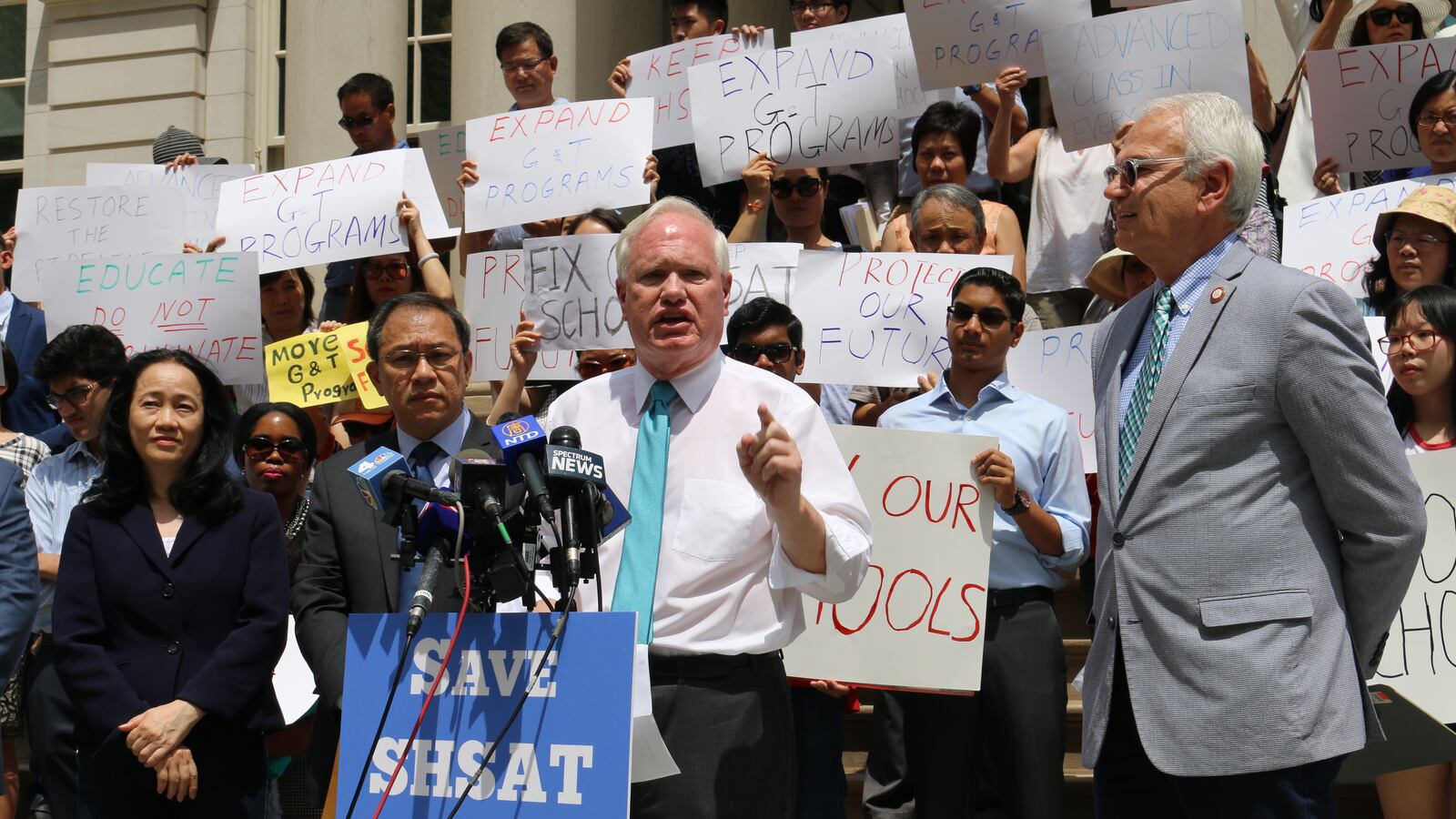In the battle to integrate New York City’s specialized high schools, some have argued that the city’s efforts should start much earlier: with more gifted and talented programs in elementary and middle school.
A new bill proposed by New York Sen. Tony Avella aims to do just that by expanding gifted offerings and by starting a new track of classes for advanced students. But how much the bill will actually spur integration is unclear.
Advocates for the legislation rallied Tuesday at City Hall, positioning the proposal as an alternative to scrapping the entrance exam to specialized high schools.
“This is all designed to give kids a better education, so they can pass the test,” Avella said.
The legislation, introduced on July 27, echoes calls from other elected officials and some alumni from the specialized high schools who say gifted classes provide a pipeline into the city’s vaunted high schools.
Mayor Bill de Blasio recently sparked a heated debate when he proposed eliminating the exam that currently serves as the sole admissions gatekeeper to specialized high schools in an effort to make them more diverse. Although about 70 percent of students citywide are black or Hispanic, those students comprise only 10 percent of enrollment at the specialized high schools.
Gifted programs, currently offered only in the elementary grades, are similarly segregated: Only 22 percent of students in this track are black or Hispanic.
Supporters of Avella’s legislation say the law would restore a reliable pathway leading to specialized high schools that used to be more prevalent in low-income neighborhoods.
“If we do that, we would not have a diversity problem,” said Wai Wah Chin, president of the Chinese American Citizens Alliance. “We need to meet the needs of children who are above grade level.”
While the city doesn’t technically have gifted programs after fifth grade, some middle schools enjoy a reputation akin to gifted because they often admit students who have attended an accelerated program in elementary school or because they have their own entrance exams.
Those middle schools, in turn, feed an outsized share of students to the specialized high schools. For example, at the Anderson School in Manhattan, which offers a gifted program in the lower grades that is among the most competitive in the city to get into, almost all eighth-graders took the specialized high school test, and 76 percent of them were offered admission. More than 51 percent of the school’s students are white.
But there are reasons to be skeptical of the legislation, which doesn’t include explicit measures to boost diversity.
“I think it’s a smokescreen,” said Lazar Treschan, who has studied the city’s specialized high schools closely for the Community Service Society of New York, an organization that advocates for low-income residents. “The people who are getting in now are pretty much going to keep getting in” to specialized high schools.
Here’s a cheat sheet to explain what the legislation would do, and why it might fall short of its goal.
What would the bill do?
The bill has two main components. The first would expand gifted offerings. The second would create a new program for advanced students — one that does not require the standard gifted test for admission.
- The bill would require the city to offer gifted programs in every school district. The city has been steadily increasing access to gifted programs in districts that have long gone without. Officials have done that by launching new programs that start in third grade, rather than kindergarten. Next year, every district will offer a gifted program, but the legislation would mandate this by the state.
- The legislation would also create a formal gifted track in middle schools, where today there is none. Students would be guaranteed admission if they attended a gifted program in elementary school. For others, a new entrance exam would be created to enroll in a gifted program for grades six through eight.
- Additionally, the bill would create a parallel program for accelerated students, which would not use the current gifted test for admissions. The bill says students would be admitted based on “academic merit,” but it does not define what that means or who would make such enrollment decisions.
- These accelerated programs would be required in every school where there are at least four classes per grade level.
Why the proposal could fall short:
- Gifted programs are already deeply segregated, so an expansion isn’t likely to spur more diversity absent other measures to increase integration.
- Gifted programs would still rely on an entrance exam to determine admissions — and create a new test for middle school students. Integration advocates trace the diversity problems in gifted — and specialized high schools — back to admissions tests. Critics say that the tests advantage students with the time and resources to prepare.
- The bill’s advocates say the new, accelerated courses would help solve that problem. But there’s nothing in the legislation that guarantees a more diverse group of students would be admitted to these classes, and other diversity efforts have backfired. For example: After the city expanded a program that offers admission to specialized high schools to students from low-income families whose scores just missed the admissions cut-off, white and Asian students were the ones who mostly benefited.
- The legislation doesn’t change anything about how students are admitted to specialized high schools. Critics of the current system say one of the few surefire ways to admit more black and Hispanic students is to move to a system like the one de Blasio is proposing, which would admit top performers from every public middle school.

